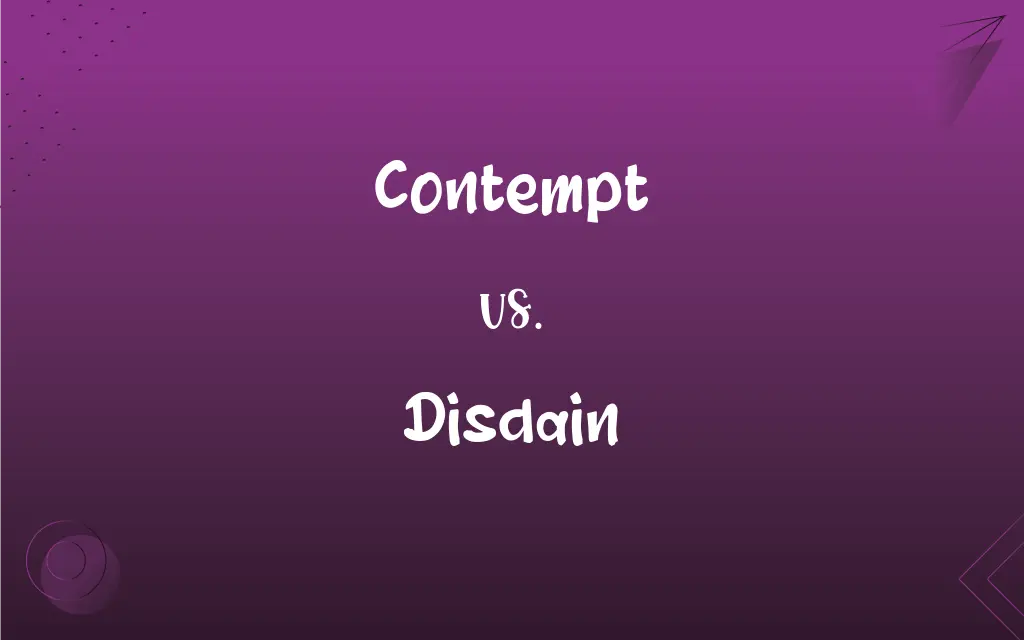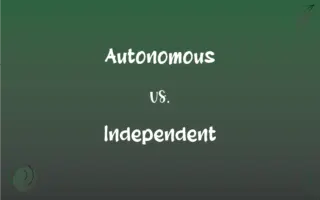Contempt vs. Disdain: What's the Difference?
By Janet White || Published on December 5, 2023
Contempt is a strong feeling of disrespect and inferiority towards someone or something, while disdain is a feeling of superiority and scorn.

Key Differences
Contempt implies deep disrespect and devaluation of someone, often mixed with feelings of intense dislike, while disdain is characterized by a proud rejection or scorn for something deemed unworthy.
Contempt often arises from a perceived lack of worth or ethics in the other party, whereas disdain is rooted in a sense of superiority or aloofness.
Contempt can be viewed as a more intense and disdainful feeling, encompassing both anger and a sense of moral superiority, while disdain lacks the intensity of contempt, focusing more on aloofness and rejection.
The expression of contempt may involve overt actions or behaviors, indicating a deep-seated aversion, while disdain is often expressed through indifference or dismissive attitudes.
Contempt often carries a sense of moral judgment or condemnation, while disdain may be based on personal preferences or tastes, without necessarily implying moral superiority.
ADVERTISEMENT
Comparison Chart
Emotional Intensity
Strong, often with anger and moral judgment.
Less intense, more about scorn and aloofness.
Root Cause
Perceived lack of worth or ethics.
Sense of superiority or rejection of unworthiness.
Expression
Overt actions or behaviors.
Indifference or dismissive attitude.
Associated Feelings
Deep disrespect, aversion.
Scorn, aloofness.
Moral Judgment
Often involves moral condemnation.
Less about moral judgment, more about personal view.
ADVERTISEMENT
Contempt and Disdain Definitions
Contempt
Contempt involves a strong dislike mixed with disrespect.
They held his dishonest behavior in contempt.
Disdain
It is the refusal to acknowledge as worthy of respect or attention.
She held disdain for those who are dishonest.
Contempt
It is the feeling that a person or a thing is worthless.
His actions were regarded with contempt by the community.
Disdain
It involves contemptuous regard or rejection.
His disdain for superficial gossip was evident.
Contempt
Contempt is a feeling of disdain and lack of respect.
She looked at the corrupt official with contempt.
Disdain
Disdain is an attitude of superiority and aloofness.
He looked at the messy room with disdain.
Contempt
It implies considering someone or something as inferior.
He treated his opponent's ideas with contempt.
Disdain
Disdain is the feeling of being superior to and scornful of someone or something.
She viewed his childish behavior with disdain.
Contempt
Contempt is scornful disregard for something.
She expressed her contempt for the unfair rules.
Disdain
Disdain is a lack of respect accompanied by a feeling of intense dislike.
The artist's work was met with disdain by the critics.
Contempt
The feeling or attitude of regarding someone or something as inferior, base, or worthless; scorn.
Disdain
To regard or treat with haughty contempt
Critics who disdained the writer as a hack.
FAQs
How is disdain expressed in social interactions?
Through aloofness, scorn, or dismissive attitudes.
Can contempt be a response to betrayal?
Yes, contempt can arise from feelings of betrayal or dishonesty.
How does contempt affect relationships?
It can severely damage relationships through disrespect and aversion.
Is disdain always obvious?
Not always; it can be subtle, expressed through indifference or avoidance.
What causes feelings of contempt?
Contempt is caused by seeing someone as inferior or unethical.
What differentiates contempt from hatred?
Contempt involves a sense of superiority, while hatred is intense dislike.
Is disdain always negative?
While typically negative, it can be positive in rejecting harmful norms.
Can disdain be a defense mechanism?
Yes, it can be used to distance oneself from what is deemed unworthy.
Is contempt an emotion or an attitude?
It's both an emotion and an attitude of disrespect and inferiority.
Can disdain be respectful?
It's typically disrespectful, but can be polite in certain contexts.
Is disdain related to personal preferences?
Yes, it often arises from personal tastes or standards.
Does contempt always involve moral judgment?
Often, but not always; it can be based on personal dislike too.
Can contempt be constructive?
Rarely, as it often involves devaluation and disrespect.
Does disdain imply intelligence?
Not necessarily; it's more about personal views and standards.
Does disdain require emotional investment?
Disdain often involves less emotional intensity than contempt.
Can contempt be justifiable?
It can be seen as justifiable in response to unethical or harmful actions.
Is disdain a sign of ego?
It can be, as it involves a sense of superiority.
How is contempt shown in body language?
Through eye rolls, sneering, or dismissive gestures.
How do societal norms influence disdain?
Societal norms can dictate what is viewed with disdain.
Can contempt be silent?
Yes, it can be expressed non-verbally through gestures or expressions.
About Author
Written by
Janet WhiteJanet White has been an esteemed writer and blogger for Difference Wiki. Holding a Master's degree in Science and Medical Journalism from the prestigious Boston University, she has consistently demonstrated her expertise and passion for her field. When she's not immersed in her work, Janet relishes her time exercising, delving into a good book, and cherishing moments with friends and family.







































































